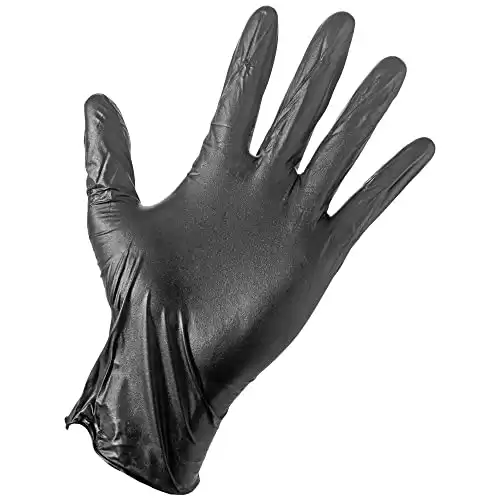Disposable mechanic gloves ensure that you do not go home with grease-stained hands. They also protect your hands against hazardous chemicals and fluids that you may be exposed to when working. Nitrile gloves are an affordable option.
Disposable mechanic gloves are either made of nitrile or latex. Both types of gloves are designed to provide adequate protection for mechanics. However, nitrile gloves are becoming preferable due to their durability, thickness, and chemical resistance, among other factors.
Furthermore, OSHA recommended nitrile gloves in their 1910.132 Personal Protective Equipment Standard.
This article will discuss the top benefits of nitrile mechanic gloves. It will also highlight their cons.
Benefits of Nitrile Mechanic Gloves

Puncture Resistant
Nitrile gloves are made from synthetic rubber known as nitrile butadiene. This form of rubber is flexible, thick, and sturdy, which makes nitrile gloves puncture-resistant. As such, they offer a high level of protection even when working with sharp-edged tools. They protect your hands from cuts and abrasions.
Can Withstand High Temperatures
While nitrile gloves will not shield you from burning if you touch hot items or surfaces, they do not melt or get hot when working in high-temperature environments.
Chemical Resistant
This is one of the main reasons nitrile gloves are becoming more popular. While latex also offers excellent chemical protection, nitrile gloves provide superior chemical protection.
They are inert against most chemicals. Therefore, they can be used to handle a wide range of chemical substances, including gasoline, oils, acids, alcohols, refrigerants, transmission fluid, brake fluid, and battery electrolytes.
Dexterity and Sensitivity to Touch
OSHA rates nitrile gloves highly for dexterity and sensitivity to touch. They are flexible and lightweight. They are suitable for handling small objects and doing tasks that require a high level of precision. They provide excellent grip on objects. Some manufacturers make textured nitrile gloves for a superior grip.
Due to their high sensitivity to touch, mechanics can use their smartphones and other touch screen devices without removing the gloves.
Water-Resistant
Nitrile gloves are water-resistant. They keep any fluids you are handling away from your hands. They are suitable for coolants, cleaning fluids, and other liquids.
With that said, they may cause your hands to sweat. The impermeable layer that makes them water-resistant prevents proper ventilation that can lead to sweaty hands.
To combat this issue, some latex gloves are powdered on the inside, while others have a fleece lining that absorbs sweat and dampness and enhances comfort. The fleece lining is preferable during the colder seasons to keep your hands warm.
Conversely, most nitrile gloves do not have an inner lining or a powdered interior. Therefore, you might have to change your nitrile gloves frequently if your hands get too sweaty.
Other alternative methods used to combat sweaty hands when wearing nitrile gloves are:
- Applying corn starch or powder on your hands before wearing the gloves
- Appling ethanol on your hands – it produces a cooling effect on your hands
- Wearing fingerless cloth glove liners before putting on the nitrile gloves
- Ensuring that the gloves are not too tight
Non-Allergenic
Since latex is allergenic, nitrile gloves are a better option if you are prone to a latex allergy or have other skin sensitivities. Some people are also allergic to cornstarch in powdered latex gloves, making nitrile gloves better suited.
Suitable for Heavy Duty Work
While latex gloves are mainly suitable for light-duty work, nitrile gloves are suited for both light and heavy-duty work. They have a certain degree of puncture resistance, chemical resistance, and ruggedness. Nitrile mechanic gloves also offer an excellent grip and can withstand high temperatures when handling heavy machinery and tools.
Comfortable Fit
Both latex and nitrile gloves offer a flexible fit if you get the right size. They have a light feel on the hands. However, nitrile gloves are much thinner and tend to conform better to the shape of your hand, allowing for a much more comfortable feel and fit. They have a friction-resistant coating, which enables easy wear.
Affordability
Generally, nitrile disposable gloves are more expensive than reusable gloves. However, nitrile disposable gloves are slightly more expensive than latex gloves. If you use disposable gloves often, it is best to buy them in a box. It is much cheaper, and it will last you a long time.
In summary, below are the pros and cons of nitrile gloves
Pros
- Affordable
- Readily available
- Chemical resistant
- Puncture resistant
- Offers excellent grip
- Provide superior dexterity and sensitivity to touch
- Recommended by OSHA for PPE
- Suitable for people who are allergic to natural rubber or latex
- Can be used for both light and heavy-duty work
- Longer shelf-life
Cons
- Make hands sweaty
- Poor air circulation and ventilation on the hands
- Non-biodegradable
Tips for Using Nitrile Mechanic Gloves Effectively
- Get the right size gloves for your hands. Measure the circumference of your hand around the palm. Compare the measurements against the chart size for the particular nitrile gloves brand you want to buy to get your glove size. The right glove should fit your hands snugly yet not too tight or loose
- Clean your hands and then dry them completely before wearing the gloves
- Remove any jewelry from your hands and ensure your nails are short before wearing the gloves. Any sharp objects can puncture and tear the gloves allowing contaminants to penetrate your hands
- Do not reuse your nitrile gloves. Most nitrile gloves are designed for one use only. Subsequent uses make them prone to tearing, tear and wear, and damage any chemicals
- When switching between tasks, put on a fresh pair of gloves for each new task
Conclusion
Nitrile gloves are the most suitable type of disposable gloves for mechanics. They offer protection against incidental and extended contact with harmful chemicals and liquids. There is a wide variety of nitrile gloves to choose from on the market at an affordable price. They are available in different sizes, and some have textured fingertips for enhanced grip.
Nitrile Mechanics Gloves FAQS
Are nitrile gloves better than vinyl gloves?
Generally, nitrile gloves are of superior quality to vinyl gloves. They are durable, chemical resistant, and offer a comfortable fit. They offer better protection against hazardous substances.
Vinyl gloves are more affordable than nitrile gloves. On the downside, vinyl gloves are more prone to tears and cuts. They are better suited for low-risk, short-term tasks, while nitrile gloves can be worn for extended periods. Both are latex-free.
Are nitrile gloves better than latex gloves?
Nitrile gloves have better chemical resistance and puncture resistance than latex gloves. Both have high water resistance. Latex gloves are generally cheaper than nitrile gloves. Latex gloves are best suited for lighter tasks, while nitrile gloves can be used for heavy-duty tasks.
Do nitrile gloves offer hand protection against all types of chemicals?
Nitrile gloves offer hand protection against most types of chemicals. However, they are not recommended for handling extremely hazardous substances such as highly corrosive chemicals, concentrated acids, and acetates.
Is nitrile hazardous?
Although nitrile is derived from cyanide salts, most nitriles are not hazardous. However, it is not biodegradable.


